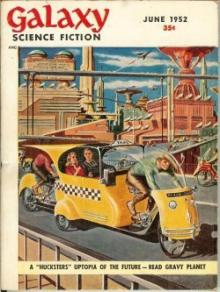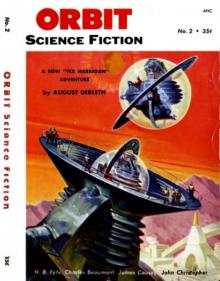- Home
- Michael Shaara
Potential Enemy Page 3
Potential Enemy Read online
Page 3
but hecouldn't stop now. "Because you are not really 'aliens,' but of Earthitself. Several facts point that way. For instance, your ships areminute models of Earth ships, or, rather, of human ships. You haveobviously copied them. Then, too, you have been able to communicate withhumans too easily. An alien to our world would have had much moretrouble. Our ways, our methods of thinking, are not strange to you."
_You have discovered a secret which has been kept for many centuries,Markham Gray._
He was more at ease now; somehow there was no threat in the attitude ofthe other. Gray said, "The hardest thing for me to understand is why it_has_ been kept a secret. Obviously, you are a tiny form of Earth life,probably an insect, which has progressed intellectually as far beyondother insect forms as man beyond other mammals. Why have you kept thisa secret from humans?"
_You should be able to answer that yourself, Mr. Gray. As we developed,we were appalled by the only other form of life on our planet with adeveloped intelligence. Why, not even your own kind is safe from yourbloodlust. The lesser animals on Earth have been either enslaved byman--or slaughtered to extinction. And even your fellows in the recentpast were butchered; man killed man wholesale. Do you blame us forkeeping our existence a secret? We knew that the day humans discoveredthere was another intelligence on Earth they would begin making plans todominate or, even more likely, to destroy us. Our only chance was tofind some refuge away from Earth. That is why we began to search theother stars for a planet similar to this and suitable to our form oflife._
"You could have fought back, had we attempted to destroy you," Gray saiduncomfortably.
The next words were coldly contemptuous. _We are not wanton killers,like man. We have no desire to destroy._
Gray winced and changed the subject. "You have found your new planet?"
_At last. We are about to begin transportation of our population to thenew world. For the first time since our ancestors became aware of theawful presence of man on the Earth, we feel that we can look forward tosecurity._
Markham Gray remained quiet for a long time. "I am still amazed that youwere able to develop so far without our knowledge," he said finally.
There was an edge of amusement in the answering thought. _We are verytiny, Mr. Gray. And our greatest efforts have always been to keep fromunder man's eyes. We have profited greatly, however, by our suitabilityto espionage; little goes on in the human world of which we don't know.Our progress was greatly aided by our being able to utilize the sciencethat man has already developed. You've noted, for instance, how similarour space ships are to your own._
Gray nodded to himself. "But I'm also impressed by the manner in whichyou have developed some mechanical device to duplicate human speech.That involved original research."
_At any rate, neither man nor we need dread the future any longer. Wehave escaped the danger that overhung us, and you know now that we areno alien enemies from space threatening you. We wish you well, mankind;perhaps the future will see changes in your nature. It is in thisfriendly hope that we have contacted humanity through you, Mr. Gray._
The elderly journalist said quietly, "I appreciate your thoughtfulnessand hope you are correct. Good luck to you in your new world."
_Thank you, Markham Gray, and goodbye._
The set was suddenly quiet again.
* * * * *
Markham Gray stood before the assembled Military Council of the SolarSystem. He had told his story without interruption to this most powerfulbody on Earth. They listened to him in silence.
When he had finished, he waited for their questions. The first came fromSupSpaceCom Michell. He said, thoughtfully, "You believe their words tobe substantially correct, Gray?"
"I believe them to be entirely truthful, your excellency," thejournalist told him sincerely.
"Then they are on the verge of leaving the Earth and removing to thisother planet in some other star system?"
"That is their plan."
The SupSpaceCom mused aloud. "We'll be able to locate them when theyblast off en masse. Their single ships are so small that they missedbeing observed, but a mass flight we'll be able to detect. Our cruiserswill be able to follow them all the way, blasting them as they go. Ifany get through to their new planet, we'll at least know where they areand can take our time destroying it."
The President of the Council added thoughtfully, "Quite correct,Michell. And in the early stages of the fight, we should be able tocapture some of their ships intact. As soon as we find what kind ofinsect they are, our bacteriologists will be able to work on a method toeliminate any that might remain on Earth."
Markham Gray's face had paled in horror. "But why?" he blurted. "Why notlet them go in peace? All they've wanted for centuries is to escape us,to have a planet of their own."
SupSpaceCom Michell eyed him tolerantly. "You seem to have been takenin, Mr. Gray. Once they've established themselves in their new world, wehave no idea of how rapidly they might develop and how soon they mightbecome a threat. Even though they may be peaceful today, they arepotential enemies tomorrow. And a potential enemy _is_ an enemy, whomust be destroyed."
Gray felt sickness well through him "But ... but this policy.... Whathappens when man finally finds on his borders a life form more advancedthan he--an intelligence strong enough to destroy rather than bedestroyed?"
The tolerance was gone now. The SupSpaceCom said coldly, "Don't be apessimistic defeatist, Gray."
He turned to the admirals and generals of his staff. "Make allpreparations for the attack, gentlemen."

 The Killer Angels: The Classic Novel of the Civil War
The Killer Angels: The Classic Novel of the Civil War 2066 Election Day
2066 Election Day For Love of the Game
For Love of the Game The Book
The Book Galaxy
Galaxy Conquest Over Time
Conquest Over Time Potential Enemy
Potential Enemy Soldier Boy
Soldier Boy Wainer
Wainer The Civil War Trilogy: Gods and Generals / the Killer Angels / the Last Full Measure
The Civil War Trilogy: Gods and Generals / the Killer Angels / the Last Full Measure The Killer Angels
The Killer Angels